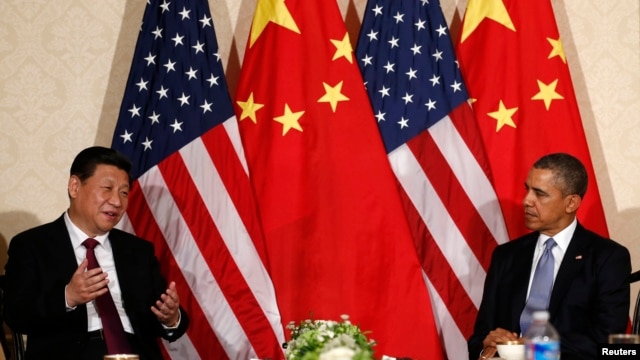BEIJING: Leaders of 21 Asian nations are meeting in Beijing in the coming days for the Asia Pacific Economic Cooperation (APEC) summit. President Barack Obama and Secretary of State John Kerry will meet with Chinese leaders amidst a changed political landscape from when Obama and China’s President Xi Jinping met more than one year ago.
Some observers say U.S. China relations are at their worst ever as U.S. leaders travel to Beijing this weekend to meet with their Chinese counterparts.
In a speech before his trip to Asia, Secretary of State Kerry said U.S.-China relations are the most consequential in the world.
In a speech before his trip to Asia, Secretary of State Kerry said U.S.-China relations are the most consequential in the world.

"Let me [be] clear. The U.S. will never shy away from articulating our deeply held values or defending our interests, allies and partners throughout the region. And China is well aware of that," he stated. "But the relationship between our two countries has developed and matured over time."
President Obama and President Xi are expected to meet for bilateral talks later next week.
The summit between them comes just after midterm elections in the United States, in which Republicans won control of the Senate, curbing President Obama’s ability to push his legislative agenda.
An editorial in Thursday’s state-run Global Times newspaper said the vote was a referendum on Obama’s political achievements, and now the president will “have to swallow the bitterest pill.” The editorial said that the Republican-controlled Congress could take a tougher line against Beijing.
US pivot policy
The U.S. pivot to Asia, cyber security concerns and China’s refusal to join sanctions against Russia have tested Sino-U.S. ties.
Wang Yiwei, a professor in the School of International Studies at Renmin University, said these are reflections of the tensions around China’s growing economy and Beijing’s interest in increasing its influence abroad.
"My impression about the U.S. from my trip there recently is that they have two concerns about China. Number one is that China is undermining America's leadership in the Asia Pacific. So in terms of great power relations. Secondly the U.S. is concerned China wants to build other international systems that will bypass the American-led systems, like AAID and BRICS banks," said Wang Yiwei.
Seeking transparency
The United States has said it is not trying to contain China’s rise, and concerns over Beijing’s international lending efforts are mostly over their transparency and adherence to international practices.
Despite China’s growing might, Secretary of State Kerry this week said Washington will not shy away from confronting China on issues of human rights, and the ongoing pro-democracy protests still simmering in Hong Kong.
"The United States will always advocate for all countries to permit their citizens to express their grievances publicly and peacefully and without fear of retribution. That is why we have spoken out about the situation in Hong Kong and human rights issues, because respect for fundamental freedoms is now and always has been a centerpiece of American foreign policy," said Kerry.
Following the APEC summit a key test for U.S. China relations will be achieving consensus on climate change. Leaders will meet again in one year in Paris to set targets for reducing greenhouse gas emissions by 2020.

No comments :
Post a Comment